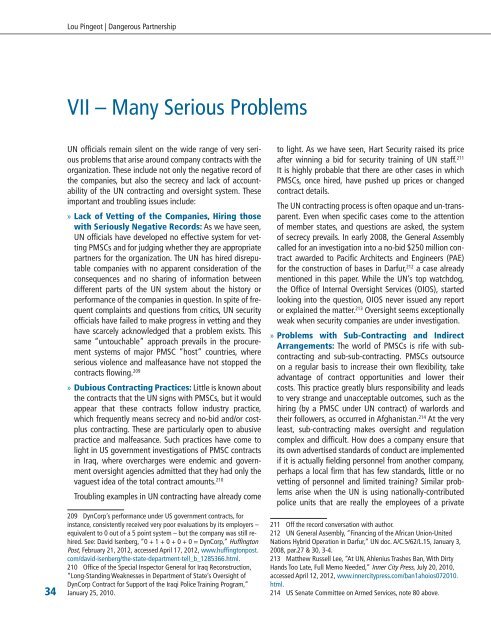Dangerous Partnership - Global Policy Forum
Dangerous Partnership - Global Policy Forum
Dangerous Partnership - Global Policy Forum
Create successful ePaper yourself
Turn your PDF publications into a flip-book with our unique Google optimized e-Paper software.
Lou Pingeot | <strong>Dangerous</strong> <strong>Partnership</strong><br />
VII – Many Serious Problems<br />
34<br />
UN officials remain silent on the wide range of very serious<br />
problems that arise around company contracts with the<br />
organization. These include not only the negative record of<br />
the companies, but also the secrecy and lack of accountability<br />
of the UN contracting and oversight system. These<br />
important and troubling issues include:<br />
»»<br />
Lack of Vetting of the Companies, Hiring those<br />
with Seriously Negative Records: As we have seen,<br />
UN officials have developed no effective system for vetting<br />
PMSCs and for judging whether they are appropriate<br />
partners for the organization. The UN has hired disreputable<br />
companies with no apparent consideration of the<br />
consequences and no sharing of information between<br />
different parts of the UN system about the history or<br />
performance of the companies in question. In spite of frequent<br />
complaints and questions from critics, UN security<br />
officials have failed to make progress in vetting and they<br />
have scarcely acknowledged that a problem exists. This<br />
same “untouchable” approach prevails in the procurement<br />
systems of major PMSC “host” countries, where<br />
serious violence and malfeasance have not stopped the<br />
contracts flowing. 209<br />
»»<br />
Dubious Contracting Practices: Little is known about<br />
the contracts that the UN signs with PMSCs, but it would<br />
appear that these contracts follow industry practice,<br />
which frequently means secrecy and no-bid and/or costplus<br />
contracting. These are particularly open to abusive<br />
practice and malfeasance. Such practices have come to<br />
light in US government investigations of PMSC contracts<br />
in Iraq, where overcharges were endemic and government<br />
oversight agencies admitted that they had only the<br />
vaguest idea of the total contract amounts. 210<br />
Troubling examples in UN contracting have already come<br />
209 DynCorp’s performance under US government contracts, for<br />
instance, consistently received very poor evaluations by its employers –<br />
equivalent to 0 out of a 5 point system – but the company was still rehired.<br />
See: David Isenberg, “0 + 1 + 0 + 0 + 0 = DynCorp,” Huffington<br />
Post, February 21, 2012, accessed April 17, 2012, www.huffingtonpost.<br />
com/david-isenberg/the-state-department-tell_b_1285366.html.<br />
210 Office of the Special Inspector General for Iraq Reconstruction,<br />
“Long-Standing Weaknesses in Department of State’s Oversight of<br />
DynCorp Contract for Support of the Iraqi Police Training Program,”<br />
January 25, 2010.<br />
to light. As we have seen, Hart Security raised its price<br />
after winning a bid for security training of UN staff. 211<br />
It is highly probable that there are other cases in which<br />
PMSCs, once hired, have pushed up prices or changed<br />
contract details.<br />
The UN contracting process is often opaque and un-transparent.<br />
Even when specific cases come to the attention<br />
of member states, and questions are asked, the system<br />
of secrecy prevails. In early 2008, the General Assembly<br />
called for an investigation into a no-bid $250 million contract<br />
awarded to Pacific Architects and Engineers (PAE)<br />
for the construction of bases in Darfur, 212 a case already<br />
mentioned in this paper. While the UN’s top watchdog,<br />
the Office of Internal Oversight Services (OIOS), started<br />
looking into the question, OIOS never issued any report<br />
or explained the matter. 213 Oversight seems exceptionally<br />
weak when security companies are under investigation.<br />
»»<br />
Problems with Sub-Contracting and Indirect<br />
Arrangements: The world of PMSCs is rife with subcontracting<br />
and sub-sub-contracting. PMSCs outsource<br />
on a regular basis to increase their own flexibility, take<br />
advantage of contract opportunities and lower their<br />
costs. This practice greatly blurs responsibility and leads<br />
to very strange and unacceptable outcomes, such as the<br />
hiring (by a PMSC under UN contract) of warlords and<br />
their followers, as occurred in Afghanistan. 214 At the very<br />
least, sub-contracting makes oversight and regulation<br />
complex and difficult. How does a company ensure that<br />
its own advertised standards of conduct are implemented<br />
if it is actually fielding personnel from another company,<br />
perhaps a local firm that has few standards, little or no<br />
vetting of personnel and limited training? Similar problems<br />
arise when the UN is using nationally-contributed<br />
police units that are really the employees of a private<br />
211 Off the record conversation with author.<br />
212 UN General Assembly, “Financing of the African Union-United<br />
Nations Hybrid Operation in Darfur,” UN doc. A/C.5/62/L.15, January 3,<br />
2008, par.27 & 30, 3-4.<br />
213 Matthew Russell Lee, “At UN, Ahlenius Trashes Ban, With Dirty<br />
Hands Too Late, Full Memo Needed,” Inner City Press, July 20, 2010,<br />
accessed April 12, 2012, www.innercitypress.com/ban1ahoios072010.<br />
html.<br />
214 US Senate Committee on Armed Services, note 80 above.


